Spartan Lysander. The lion who did not hesitate to wear a fox skin
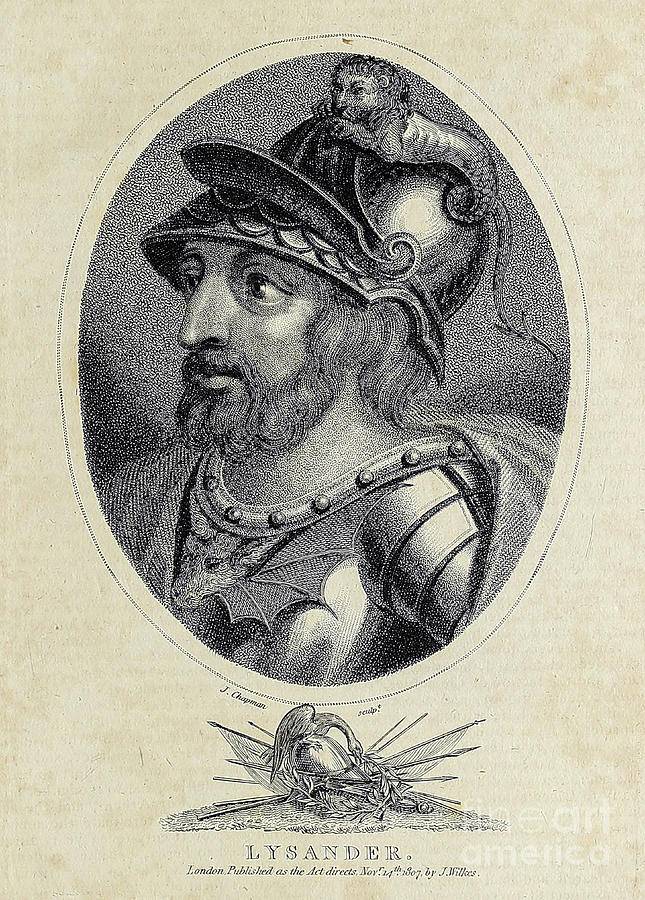
The Greek polis (state) Lacedaemon, which is often called Sparta after its main city, was founded in the XNUMXth-XNUMXth centuries. BC e. alien Dorian tribes Dimani, Pamphyli and Gillei. The people of the Achaean tribes who lived on these lands were for the most part turned into state serfs - helots. Some managed to retreat to the mountains, but were also subdued, gaining the higher status of the perieks ("living around").
For several centuries, Lacedaemon was the generally recognized cultural center of Hellas, but then it turned into a single military camp. The reason was the fiercest confrontation with Messenia, a state that significantly outnumbered Lacedaemon in terms of population. The most irreconcilably minded representatives of the old Achaean nobility found refuge in it. Lacedaemon withstood two of the most difficult wars with Messenius (in 743–724 BC and in 685–668 BC).
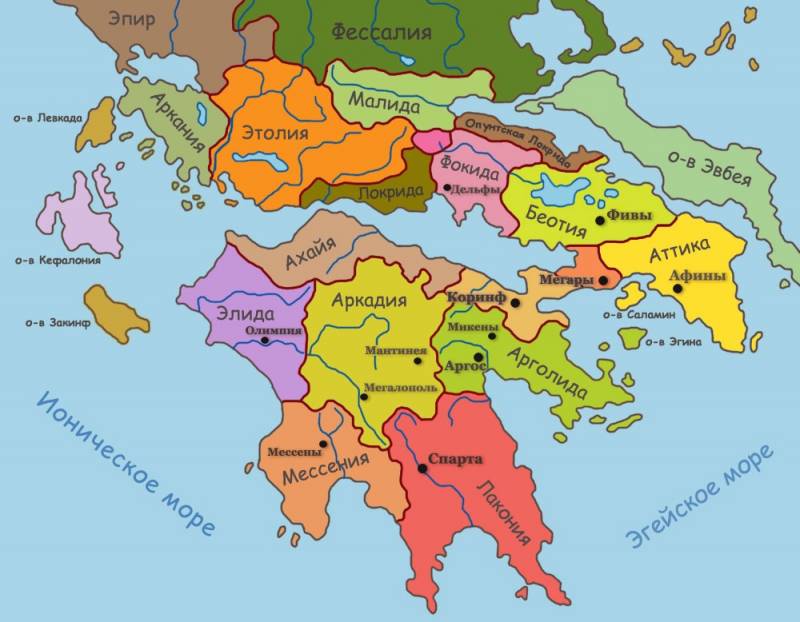
The Second Messenian War was especially terrible - at some point, Sparta was on the verge of a military disaster. Thus, in the crucibles of cruel wars, Sparta, familiar to all of us, appeared - a unique state, the elite of which practically renounced privileges, and all capable of wearing weapon citizens became warriors.
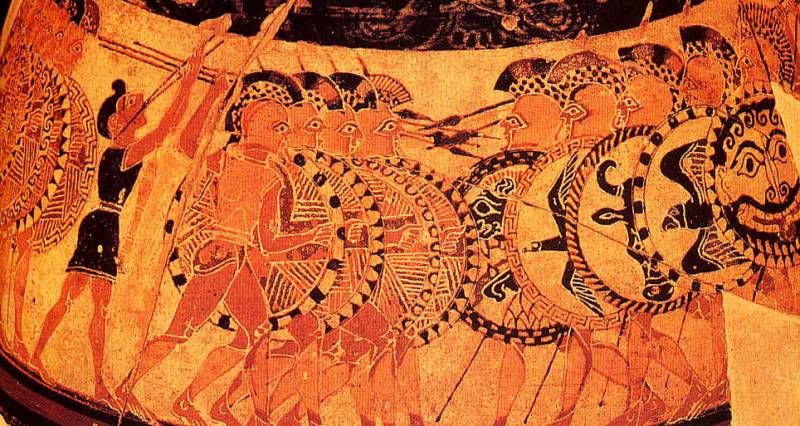
Spartan warriors and flutist, drawing from a Corinthian vase, XNUMXth century BC BC e.
There was no shortage of talented generals in Sparta, but perhaps the greatest of them was Lysander, the first of the Greeks to whom altars were erected and sacrifices made as to a god, and the first in whose honor the paeans began to be sung. Lysander, by the way, was also a very successful naval commander, it was he who crushed the sea power of Athens.
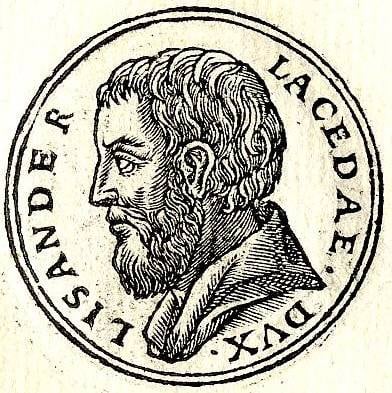
Plutarch wrote about him:
Ambition and a thirst for superiority were firmly inspired by Lysander by Spartan education, and one cannot to any significant extent consider his natural disposition to be the reason for this ...
His main distinguishing feature was the ability to easily endure poverty: he could not be seduced and bribed with money, but, despite this, he enriched his homeland.
But it was precisely the victories of Lysander, according to Plutarch, that made Sparta "selfish, and through his fault Sparta lost the respect that it had previously enjoyed for its indifference to wealth."
Plutarch also reports that in nature Lysander
Lysander himself did not see anything shameful in this, and said:
These phrases are also attributed to him, the meaning of which has long been intuitively learned by any successful politician, even if he has never read Plutarch and other authors:
And:
Lysander's student was the Spartan king and outstanding commander Agesilaus. This lame boy, according to Plutarch, was distinguished
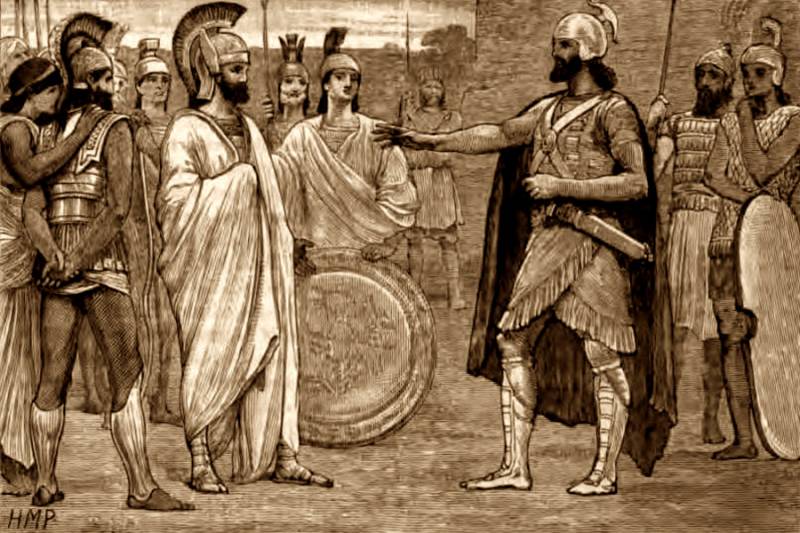
Pharnabazus and Agesilaus illustrated by E. Ollier
Agesilaus learned the lessons of Lysander well. He said:
The last phrase, by the way, is similar to the aphorism of the famous Giacomo Casanova:
So, today we will talk about Lysander.
The youth of the commander
Lysander was born around 452 BC. e. and was of rather noble origin, considered a descendant of Hercules himself, that is, he was a relative of the Spartan kings of the Agiad dynasty (its representative was, for example, the famous Leonid, who died at the Battle of Thermopylae). However, Lysander did not have any advantages over his peers and was brought up on an equal footing with everyone - in a strict Spartan spirit.
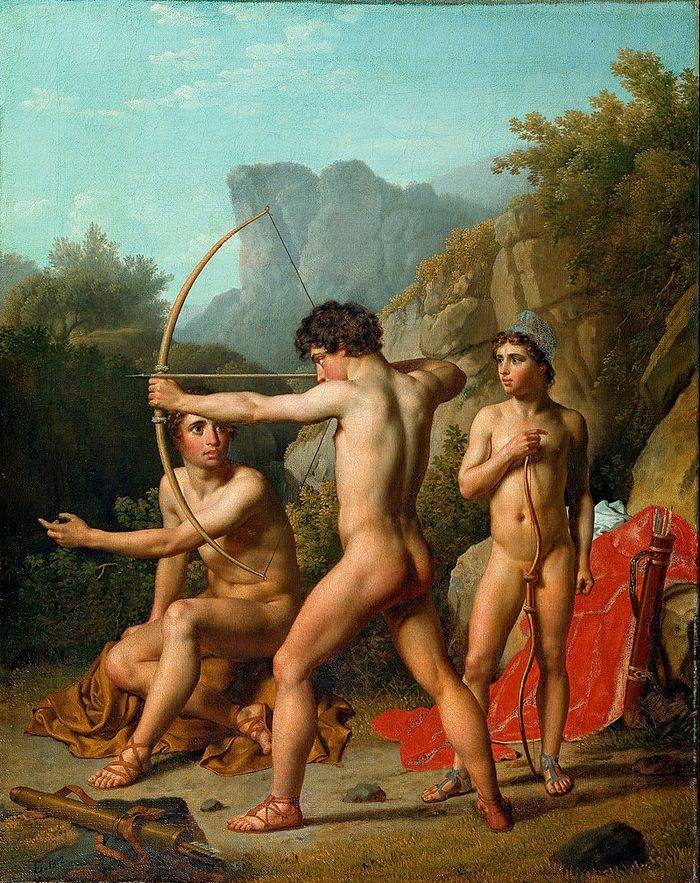
Christoffer Wilhelm Eckersberg. Spartan boys
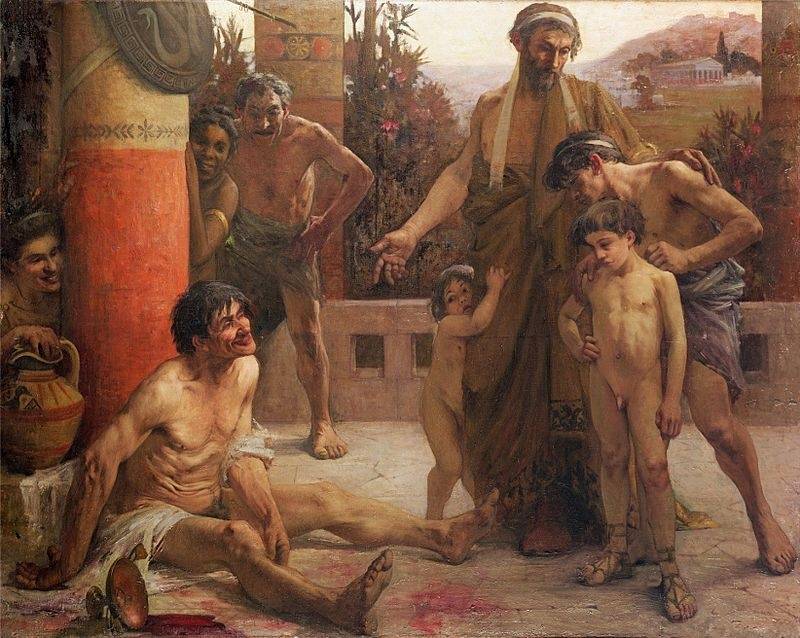
Fernand Sabatte. "Spartan showing a drunken helot to his sons"
From an early age, he attracted attention for his abilities and ability to get along with people (which Plutarch, probably not quite rightly, called "compliance"). When Lysander was 21 years old, the cruel and bloody Peloponnesian War (431–404 BC) began in Hellas, in which the Peloponnesian League, led by Sparta, was opposed by the Delian or Maritime League, created by Athens.
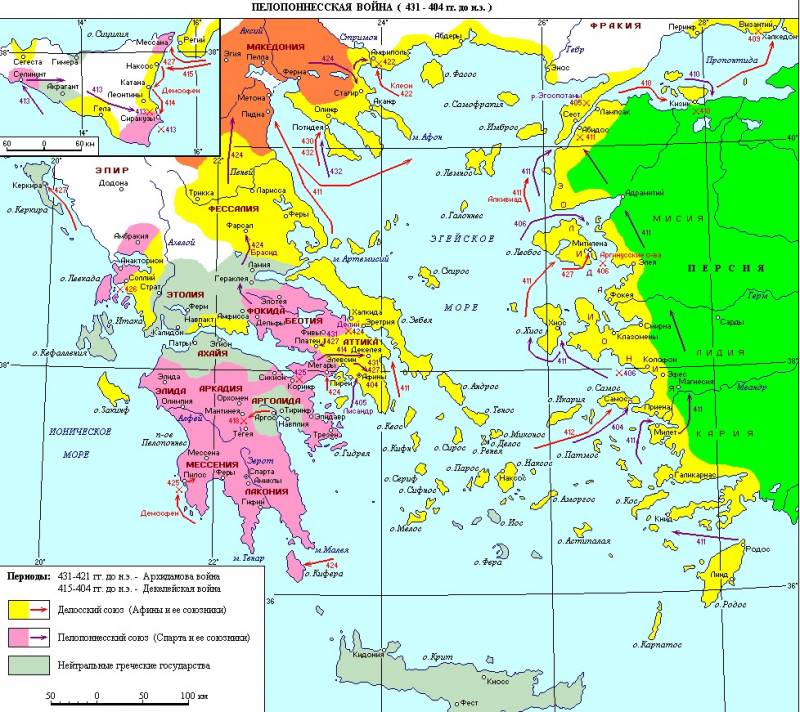
Peloponnesian and Delian alliances
Its first stage (the Archidamus War - named after the king of Sparta) ended with the mutual exhaustion of the parties, the death in the Battle of Amphipolis (422 BC) of the leaders of the "war party" - the Athenian Cleon and the Spartan Brasidas, and the conclusion of the Peace of Nikiev in 421 year BC e. In 413, the Ionian (Dekeleian War) began. Lysander probably took part in the fighting in both campaigns.
Great Opponent of Lysander
Fortunately for Sparta, the Athenians in 415 BC. e. on a far-fetched and unfair accusation, they decided to judge Alcibiades, the nephew of Pericles and a student of Socrates, who showed great promise and was to become an outstanding politician and commander.
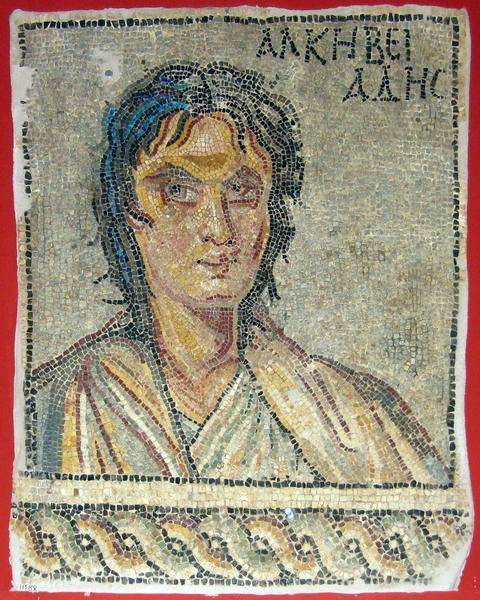
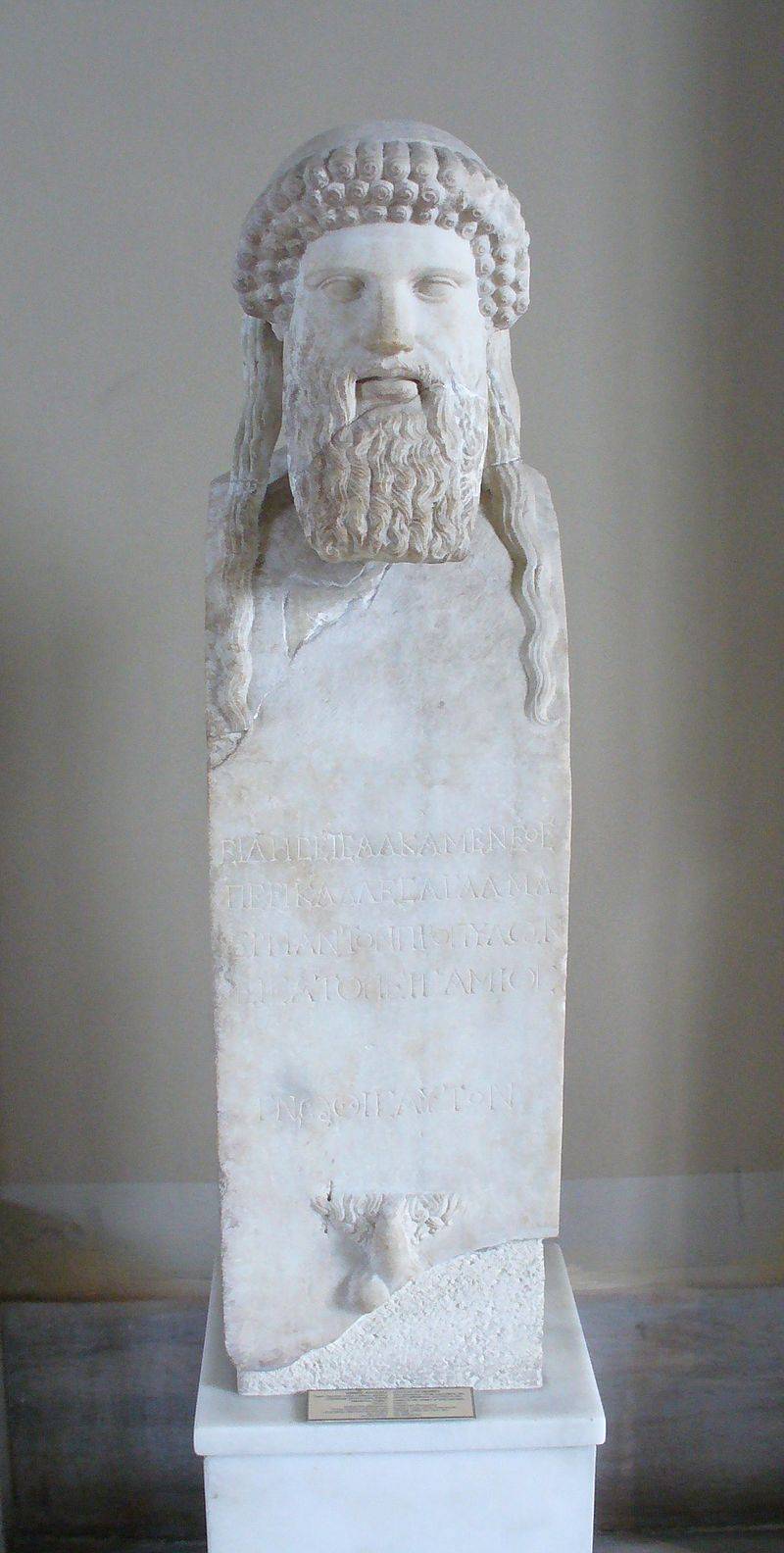
Roman copy of an Athenian herm allegedly defiled by Alcibiades
Claudius Elian directly states:
Alcibiades moved to Sparta, where he learned that he was sentenced to death in his homeland, and all his property was confiscated. Declaring that he would prove that he was still alive, he persuaded the authorities of Lacedaemon to help the besieged Syracuse - and under the leadership of the Spartan Gylippus, the Sicilians defeated the Athenian fleet of 200 ships and expeditionary forces, numbering up to 40 thousand people. Alcibiades advised the Spartans to occupy and use the Dekeley region, located north of Athens, as a permanent foothold - and about 20 thousand Athenian slaves went over to the side of the Spartans, and the Delian Union began to collapse before our eyes. Alcibiades suggested that the Spartans build a fleet, and turn to the Persians for money for its construction.
Fortunately for the Athenians, Alcibiades could not resist and seduced the wife of King Agis II Timaeus in Sparta, who gave birth to a boy from him. After that, he preferred to move to Asia Minor, which belonged to the Persians, where he advised the satrap Tissaphernes to refuse the Spartans money for the fleet, stating that mutual exhaustion of both sides was beneficial for Persia. The Athenians, desperate and oppressed from all sides, had some "clearness in mind", and in 411 BC. e they turned to Alcibiades with a request to become commander fleet.
For 4 years, he won a number of victories on land and at sea, including at Abydos, at Cyzicus, near Chalcedon, the city of Selymbria and Byzantium were taken. In 407 BC. e. Alcibiades triumphantly returned to Athens, where he was enthusiastically received by the townspeople and received the post of autocrat strategist - commander-in-chief of all armed forces.
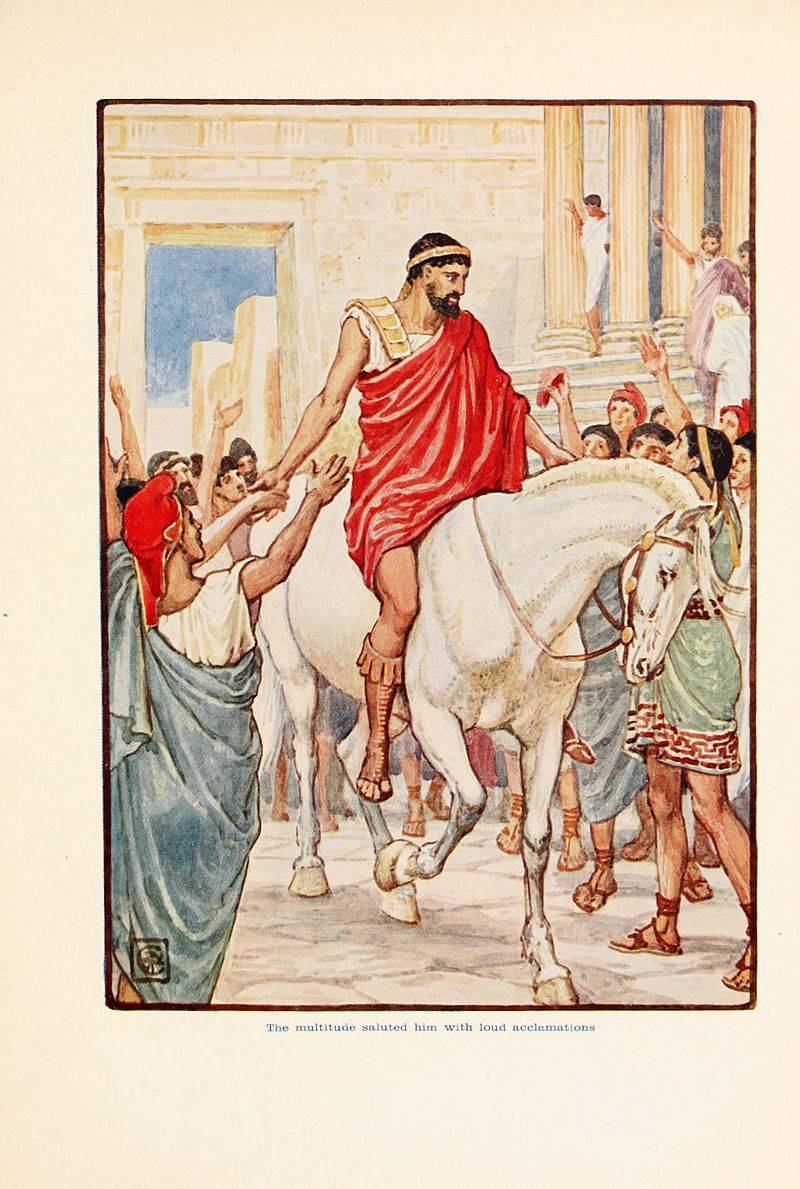
A crowd greets Alcibiades as he enters Athens in 407 BC. e. Illustration from Mary McGregor's book "History Greece told to boys and girls
In the same year, Lysander was appointed navarch of the Spartan fleet. However, fate did not allow him to find out in a personal confrontation with Alcibiades who at that moment was the best commander and naval commander of Hellas.
Savior of Sparta
Lysander became the commander of the Spartan fleet at a difficult time for his policy. He made the unpopular but proven right decision to avoid a pitched battle until new ships were completed and Lacedaemon's fleet gained superiority over the Athenian.
He managed to inflict the first defeat on the Athenians in the battle at Cape Notius - in February 406 BC. e. (according to other sources - in December 407 BC). Here, in the absence of Alcibiades, the helmsman of his ship Antiochus, contrary to a categorical prohibition, entered into battle with Lysander. The flagship of the Athenians was attacked and sunk by three Spartan triremes, Antiochus was killed, the other ships fled, and the Spartans sank 22 of them. According to tradition, the Athenians appointed Alcibiades guilty of the defeat, removing him from command.
Insulted, Alcibiades left Athens, settling in a small fortress he had captured earlier in the region of Thracian Chersonesos (on the Gallipoli peninsula near the Dardanelles). But Lysander, who won a significant victory, resigned: the highest command positions in Sparta could only be held for a year - these are the costs of democracy. He was replaced by Kallikratidas, who at first achieved success in a clash with the Athenians near the city of Mytilene, but then in August 406 BC. e. was defeated and killed in the battle of the Arginus Islands.
With the last funds (including with Persian help), the Spartans formed a squadron of 170 warships. A certain Arak was put at the head of this fleet, however, at the request of the allies of Sparta and even the Persian governor of Asia Minor, Prince Cyrus, the real command was carried out by Lysander (who could not yet officially hold the post of navarch).
In the autumn of 405 BC. e. Alcibiades learned that the Athenian fleet of 180 ships stood on the European coast of the Hellespont (Dardanelles) near the mouth of the river Egospotama, which flows opposite the city of Lampsak (where the ships of Lysander were located). He tried in vain to warn the Athenian strategist Konon about the danger of the chosen position and persuaded him to take the ship to the city of Sest - he did not even listen to the best commander of Athens.
The Spartan ships stood idle for 4 days, Lysander evaded the battle and demonstrated his indecision in every possible way. Then, choosing a convenient moment, he led his ships to attack the Athenian triremes, which did not even have time to go to sea and were destroyed at anchorages, only 8 of them managed to escape to Cyprus, the ninth ship broke through to Athens with the news of the final disaster.
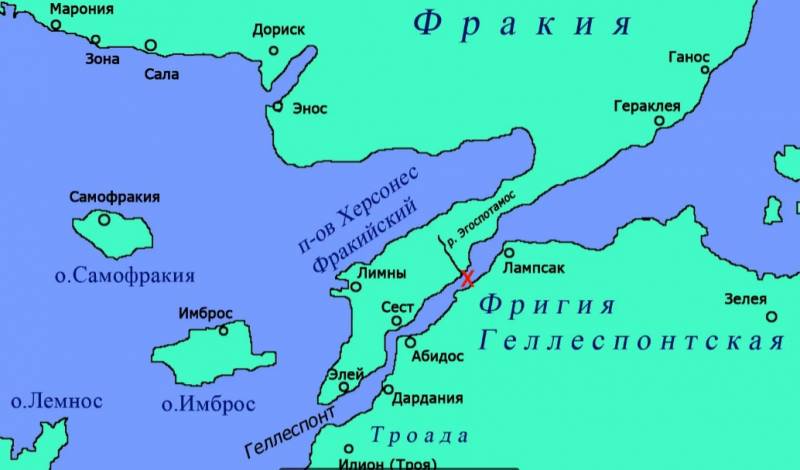
Site of the Battle of Aegospotami
Meanwhile, the landing troops of the Spartans destroyed the land camp of the Athenian army. The losses of the Athenians reached 20 thousand people killed, 3 thousand soldiers were captured. Fearing trial in Athens, Conon fled to Persia. Lysander, by the end of the year, captured Byzantium, Chalcedon, Aegina, Salamis, Milos and Thassos.
Alcibiades left his refuge in Thracian Chersonese and went to seek protection from the Persian satrap Phrygia Pharnabazus. Here he will soon be killed by the Persians at the urgent request of the new authorities of Athens, supported by Lysander: even Alcibiades, expelled and deprived of funds, still inspired fear with the possibility of a new return.
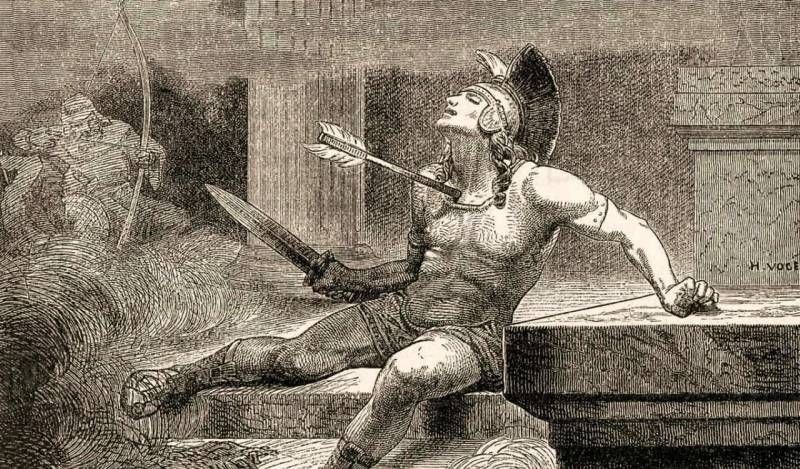
The murder of Alcibiades in a medieval engraving
Proud Athens was blocked from all sides: the Spartan kings Agis II and Pausanias led the land army, Lysander surrounded the city from the sea.
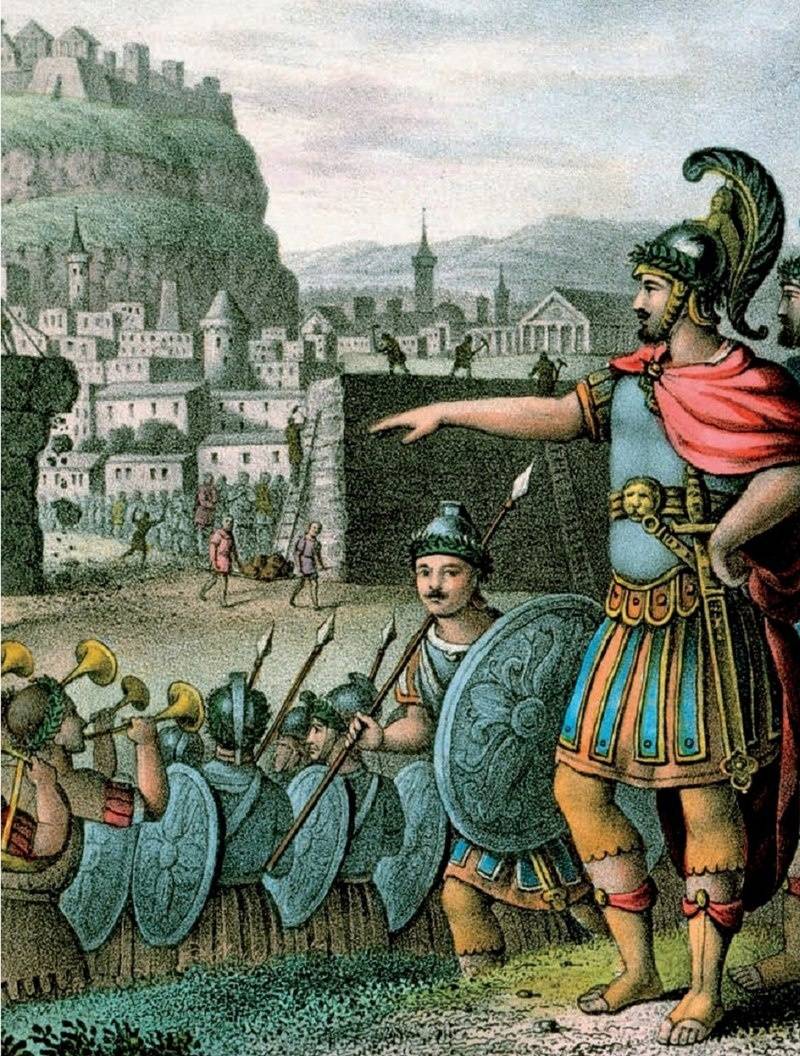
Lysander outside the walls of Athens, XNUMXth century lithograph
At the beginning of April 404 BC. e. the city capitulated, the Athenian authorities handed over to the Spartans almost all the remaining warships (with the exception of 12) and were forced to destroy the Long Walls. At the same time, the Spartans turned out to be much more moderate in their demands than their allies: Corinth and Thebes demanded the complete destruction of Athens.
The Spartan garrison was placed in the Athenian Acropolis, power in the city was transferred to "thirty tyrants". It was then that the sculptors began to sculpt the image of Lysander, the poets composed hymns in his honor, and in some Greek cities of Asia Minor they even began to give him divine honors. Thus ended the 27-year Peloponnesian War.
Hero's death
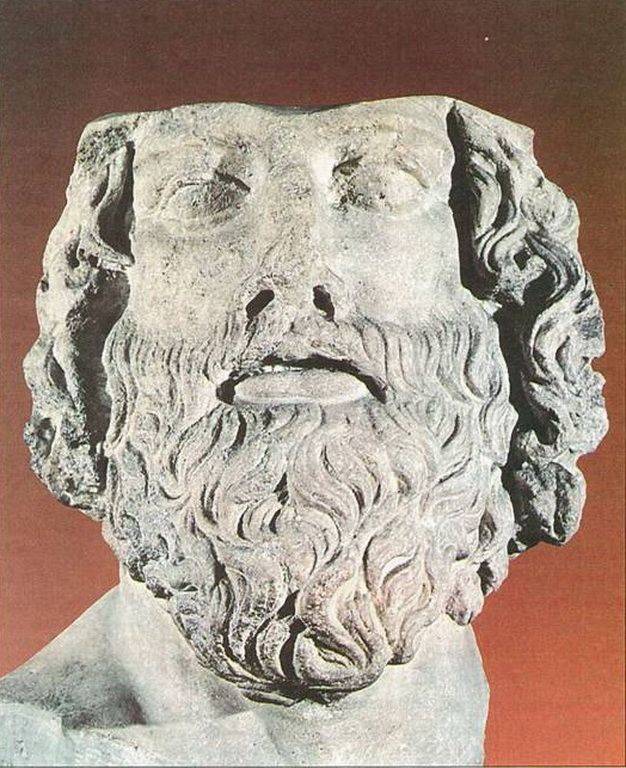
Sculpture of the head of Lysander
In 398 BC. e. The Spartan king Agis II died. Thanks to the support of Lysander, his former student, Agesilaus II, became the new king of this dynasty: he removed from power the prince Leotichid, whom everyone considered the son of Alcibiades.
However, Agesilaus was already jealous of the glory of his mentor, was burdened by the care of Lysander, and therefore, going to the next war, left him in Sparta. Agesilaus quite rightly feared that Lysander, who was experienced and possessed of unquestioned authority, would actually remove him from command. And the position of Sparta was serious: a new powerful anti-Spartan coalition was formed, which, in addition to the expelled "tyrants" of Athens, included Thebes, Corinth, Argos and the policies of the Aegean Sea. The so-called Corinthian War (396-387 BC) began.
Under these conditions, in the autumn of 395 BC. e. the second Spartan king, Pausanias, turned to Lysander. Agesilaus, at that time, fought in Asia Minor, and then the Greek mercenaries of Cyrus the Younger fought in his army - participants in the famous "Anabasis").
The detachment of Lysander moved to Thebes, where he was supposed to meet with the main army of Pausanias. According to some reports, 600 Spartan hoplites and about a thousand allied soldiers were with Lysander, he joined the militias of the Phocians, Eteans, Heracleians and Melians to them. The city of Orchomenus in Western Boeotia opened the gates before him. Deciding to resist the city of Coronea, Lysander bypassed and headed for Galiart.
Pausanias, who was at Plataea (there were up to 6 thousand people in his army only hoplites), Lysander sent a letter indicating the movement of his detachment and the time of arrival to Galiart. This letter was intercepted by the Thebans, and Pausanias' troops did not speed up their movement. The Thebans managed to pull up reserves to Galiart: part of the troops reinforced the garrison, but the main forces took up positions on the slopes of the hills southwest of the city - up to 4 thousand hoplites, about a thousand lightly armed soldiers and several hundred horsemen.
Without waiting for Pausanias, Lysander began to line up his troops in battle formation, but the Thebans attacked first - during the sacrifice that Lysander brought before the formation of his soldiers. The blow was dealt both from the front and on the left flank of the Spartans. Lysander, who was in front of the line, fell one of the first, they even call the name of the warrior who inflicted a mortal wound on him - Neochorus.
The Spartans, having lost their commander, retreated to the hills, but here they stopped and even counterattacked the enemy, throwing him back to the walls of the city. And the next day the army of Pausanias approached. The Thebans declared that they would hand over the bodies of the dead (including Lysander) only if the Spartan army was withdrawn from Boeotia.
Meanwhile, great importance was attached to the worthy burial of fallen soldiers in those days, cases are described when military leaders were put on trial if they could not agree with the enemy on the extradition of the bodies of their soldiers. So, after the victory of the Athenian fleet in the naval battle of the Peloponnesian War near the Arginus Islands (406 BC), a storm broke out, which prevented the collection of the corpses of the dead soldiers. Two strategists decided not to return to Athens, six others returned, hoping to justify themselves - and were sentenced to death (among them was the son of Pericles and the famous hetaera Aspasia).
Pausanias retreated, although some veterans demanded to attack the enemy and recapture the bodies of their comrades in a new battle. Plutarch reports:
The grief and disappointment of the Spartans was so great that Pausanias, fearing the trial of the ephors on charges of deliberate delay, which led to the death of Lysander, did not dare to return to his homeland. He went to Tegea, where he spent the last years of his life (he died after 380 BC).
The Athenian navarch Konon and the tyrant of the Cypriot city of Salamina Evagor in 394 BC. e. defeated the Spartan fleet at the Battle of Cnidus. After this victory in Athens, the "Long Walls" (to the harbor of Piraeus) were restored. The Athenian strategist Iphicrates, who is considered the creator of a new kind of troops - peltasts, in 390 BC. e. defeated the Spartans at Corinth.
The last great commander of Sparta, King Agesilaus II, who successfully fought in Asia Minor, was forced to return to Greece. Together with the navarch Antalkid, he managed to achieve victory in the Corinthian War, which ended in 386 BC. e. the conclusion in Susa of the so-called Royal peace treaty. But ahead was a war with the Boeotian Union, whose troops were commanded by Epaminondas and Pelopidas. And in Sparta there were no longer commanders of the level of Lysander and Agesilaus.
Information